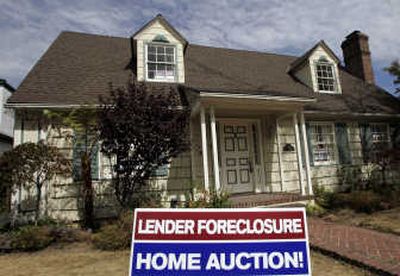How low will they go?

WASHINGTON — U.S. home prices have fallen further since mid-2006 than during the 1990-91 recession and professional traders bet they’ll plunge up to 10 percent more the next year.
If the speculative traders making big-money bets on where housing prices are headed are right, the question is not whether a U.S. recession is ahead but when it will start.
Sizable drops in home prices in a year would likely curtail consumer spending sharply. Yale University economist Robert Shiller, who has long warned of inflated home prices, says a big hit to U.S. housing assets, worth about $23 trillion, would shock the broader economy.
“It will upset balance sheets, it will upset lots of our economic institutions,” said Shiller, who argues that prices were driven higher by greed, not people looking to buy a place to live. Adjusting for inflation, housing prices have soared 86 percent in the past decade although some cities, such as New York, Los Angeles and Washington, saw far larger jumps than most regions of the country.
Yet home owners across the nation tapping into credit lines pegged to the value of their houses has been a potent economic driver in recent years. For the vast majority of U.S. households, the home is the most substantial financial asset they hold. If its value plummets so does their sense of prosperity, which can restrict spending on everything from vacations to cars and eating out or buying new clothes.
Home prices fell less than 3 percent during the economic downturn of the early 1990s and rose through the 2001 recession, but have already dropped 3.2 percent over the past year, according to a closely watched housing market index created by Shiller.
“This time, we’re in a bigger boom, and we face the possibility of a bigger decline,” Shiller told lawmakers last week. “It’s not just an issue of a recession coming up, it’s an issue of a drag on the economy, which might extend over many years.”
Record energy prices are exacerbating recession worries as the U.S. heads into the coldest season of the year in most parts of the country.
Signs of the housing market fallout are easy to find. Employers cut jobs in August for the first time in four years. Especially hard hit: homebuilders and mortgage lending companies.
On Tuesday, homebuilder Lennar Corp. posted a third-quarter loss of more than $510 million, said it had cut its work force by 35 percent so far this year and warned of future job losses.
Lennar’s disappointment came the same day the National Association of Realtors reported existing home sales fell in August to the lowest level in five years.
The slowdown is extending to major retailers, including Target Corp. and Lowe’s Cos., which have trimmed profit expectations for the year as consumer spending wanes.
“It’ going to be a distressingly long time before we get back to normal,” said University of California, Los Angeles economist Edward Leamer, who predicts a 20 percent price slide over three or four years in once red-hot real estate markets like California, Nevada and Florida.
Since the magnitude of this housing boom was unprecedented, economists are uncertain about how severe the downturn will be, says Susan Wachter, a real estate and finance professor at the University of Pennsylvania’s Wharton School of Business. She rates the odds of recession in the next year at one in three.
“We are in uncharted territory,” she adds, noting that a recession would further slow recovery in the battered housing market.